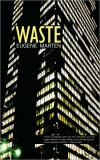Waste
Eugene Marten's second novel Waste will entrance you from the very first page, drawing you in with its tight, evocative language and magnificent pacing. For the first third of the book, you'd be excused if you thought that all you were getting was a wonderfully written but generally quiet book about a creepy janitor working late nights in a high-rise office building. You'd be wrong, but your mistake would be understandable, and quickly rectified: What follows is one of the most disturbing stories I've read.
Eugene Marten's second novel Waste will entrance you from the very first page, drawing you in with its tight, evocative language and magnificent pacing. For the first third of the book, you'd be excused if you thought that all you were getting was a wonderfully written but generally quiet book about a creepy janitor working late nights in a high-rise office building. You'd be wrong, but your mistake would be understandable, and quickly rectified: What follows is one of the most disturbing stories I've read.
Sloper, the aforementioned janitor, is a hard worker who brings certain obsessive-compulsive tendencies to work, refusing to "do favors" but otherwise doing an apparently good job. He also has the occasional unsavory habit, starting with eating out of the trashcans he empties. Sloper stuffs the found food into the pouches of his cart's yellow apron, noting at one point that "people never finish their potato salad." He also becomes obsessed with a certain woman who works in the building:
The girl who was nice to him on 24 smiled and said hello. She told him how much she appreciated what he did. She had a regular voice and straight hair, but Sloper sometimes wondered a little about her, about if maybe she was passing for something she wasn't if there was something in her blood that was darker than her skin. But of course you couldn't just ask, and he liked her thick muscular calves and watching them walk away from him when he knelt before the lobby doors . . . When she was gone, he jerked off in her shoes and cleaned them out with germicidal foam. You could use it on anything but woodwork.
After work, Sloper goes home to the basement apartment in his mother's boarding house, where his only point of contacts are with his mother's voice, yelled through the vents, and with a wheelchair-bound woman and her caretaker who live nearby. Sloper slowly befriends these neighbors, establishing his only point of contact with normality, a link that becomes as important as it is tenuous as the book proceeds.
As the book burrows deeper into the dark hole it aims to explore, Sloper's actions make clear his claim on whatever he finds in the trash, repurposing the leftover food and personal possessions of the building's tenants to his own ends. It's hard to say more about the plot without ruining the shocking twists the book takes, but it's worth pointing out that what follows is not for the faint of heart. Like Brian Evenson (who blurbed the book), Eugene Marten is writing literary horror at its finest, tearing down his characters with a combination of personal destruction and decay. Waste is a novel that will stay with even after you've finished its slim pages, its powerful stench sticking to you long after you've put it aside.





